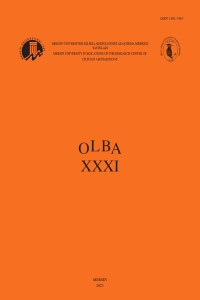New Remarks on Ptolemaic Bronze Coins With Trident Punchmark in the Light of New Data from Asia Minor
Öz
There is a very large and hollow-shaped trident punchmark on the reverse side of Ptolemaic
bronze coins, most of which belong to the Ptolemy II Philadelphos period. Some of them were also
minted during the period of Ptolemy I Soter. It is observed that almost all of them were punched
on the right field of the reverse. This stamp differs formally from the usual countermark on coins.
However, the function it has is the same. There are various publications in numismatic literature on
where, for what purpose and when the trident-shaped stamps on the Ptolemaic bronze coins were
struck. Researchers have put forward different opinions in the light of the available data. However,
limited publication of Asia Minor data prevented a more comprehensive interpretation in these
publications. Although, in the light of the examples obtained, it was first thought that they were
stamped in Berytos, one of the Phoenician cities, the idea that the punchmarks were applied on
Cyprus became popular. On the other hand, their circulation along the south and south-west coasts
of Asia Minor could not be fully considered due to limited data. In this study, the specimens found
during the archaeological research carried out in the regions of Caria, Lycia, Pamphylia and Cilicia
and the samples in the museum collections, most of which have not been published before, have
been brought together. In this way, it has been possible to make new interpretations about where, for
what purpose and when these coins were punchmarked, and to comment on the intense circulation
they showed.
Anahtar Kelimeler
Ayrıntılar
| Birincil Dil | İngilizce |
|---|---|
| Konular | Arkeoloji |
| Bölüm | Araştırma Makalesi |
| Yazarlar | |
| Yayımlanma Tarihi | 21 Mart 2023 |
| Yayımlandığı Sayı | Yıl 2023 Cilt: XXXI Sayı: XXXI |


